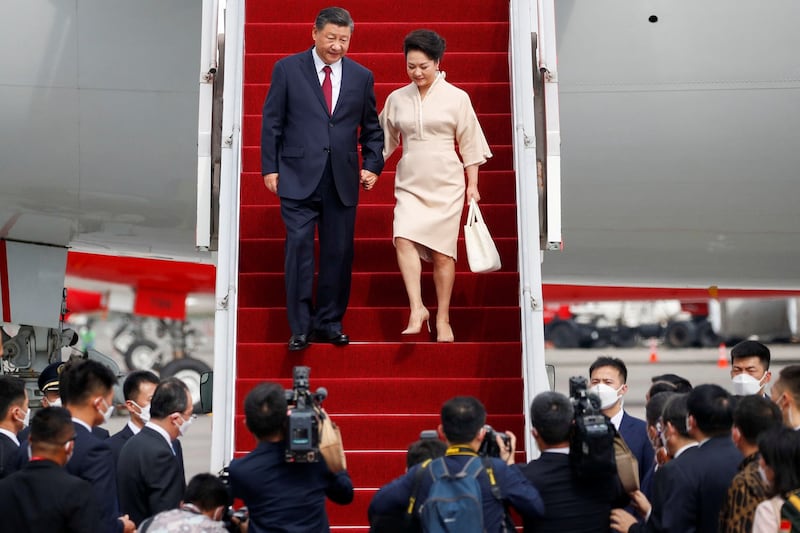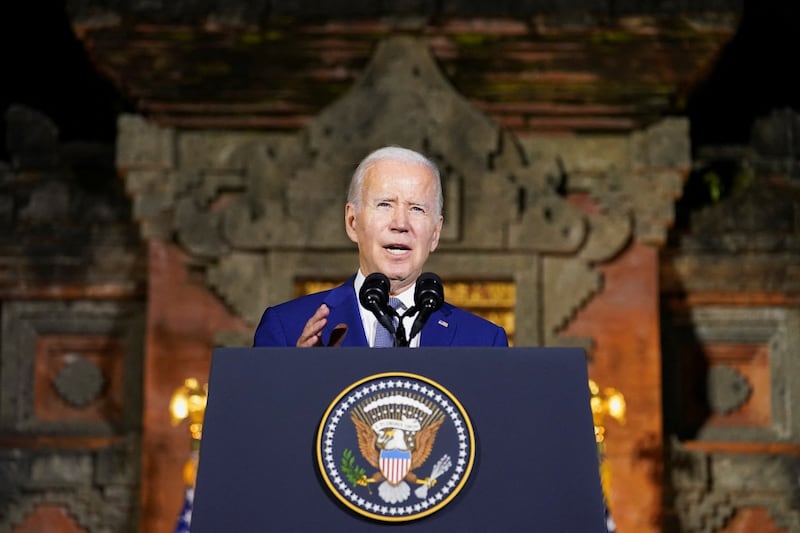UPDATED at 10:12 a.m. EST on 11-14-2022.
Chinese President Xi Jinping and U.S. President Joe Biden struck a conciliatory tone at three hours of talks Monday on the Indonesian island of Bali where they aired stark differences but underscored the need to prevent the U.S.-China strategic rivalry spilling into conflict.
It was their first face-to-face meeting since Biden took office nearly two years ago, and both sides appeared intent on checking a rapid deterioration in ties over trade, technology, defense and political influence.
“The world has come to a crossroads,” Xi said shortly after the start of the talks at a beachside hotel, on the sidelines of the Group of 20 summit being hosted by Indonesia.
“The world expects that China and the United States will properly handle the relationship,” he told his counterpart, via interpreter.
Biden told a news conference after the meeting: "I absolutely believe there need not be a new Cold War.“
During the talks he said the United States “will continue to compete vigorously” with China but “this competition should not veer into conflict.”
Biden said the U.S. and China must manage the competition responsibly and maintain open lines of communication. They also must work together to address transnational challenges “because that is what the international community expects.”
Fundamental differences
But there was no hiding of fundamental differences.
The White House said Biden raised concerns over China’s conduct in Hong Kong, against minorities in Xinjiang and Tibet, and more broadly on human rights.
Biden told reporters that he did not think “there’s any imminent attempt from China to invade Taiwan” but it was an issue that loomed large in readouts from both sides of the discussions.
“He (Biden) raised U.S. objections to the PRC’s coercive and increasingly aggressive actions toward Taiwan, which undermine peace and stability across the Taiwan Strait and in the broader region, and jeopardize global prosperity,” the White House statement said, using the abbreviation of the People’s Republic of China.
Xi described Taiwan as “the core of China's core interests,” and “the first insurmountable red line in U.S.-China relations.” He called for the U.S. leader to stick to his commitment in not supporting Taiwanese independence.
“I hope the U.S. side will put Mr. President's commitment into practice,” Xi was quoted as saying.
Xi also drew a contrast between the political and economic systems of the two powers, saying the U.S. is engaged in capitalism, and China is engaged in socialism.
“It is important for China and the United States to get along with each other by recognizing this difference and respecting it,” Xi said.
"The broad earth can accommodate the development and common prosperity of China and the United States," he said.
Shaking hands
Monday’s highly anticipated meeting came three weeks after Xi was reappointed for a norm-busting third term as leader at Chinese Communist Party, and days after Biden got a political boost at home, when the Democratic Party fared better than expected in midterm elections in the United States.
Xi landed on the Indonesian island a day after Biden, who arrived after attending a round of summits hosted by the Association of Southeast Asian Nations in Cambodia.

Their meeting began with the two leaders walking across a hallway and shaking hands and smiling in front of a row of their national flags, before sitting across from each other at the center of two identical, long tables, with their respective staffs sitting either side of them.
Although Monday’s meeting was their first in person for five years, they have spoken by phone five times since Biden took office, and met often in the past, particularly when both were vice presidents.
“I am convinced that he understood exactly what I was saying and I understood what he was saying,” Biden told reporters.
The White House said in its statement after the meeting that the two leaders agreed to empower key senior officials to communicate on issues and challenges – “such as climate change, global macroeconomic stability including debt relief, health security, and global food security.”
Contentious issues
Taiwan has long been a sore point between Washington and Beijing.
Beijing insists that the self-ruling island is an inalienable part of China and the unification of Taiwan with the mainland is a domestic affair that no other country has the right to interfere in.
Beijing has repeatedly accused Washington of giving support to “separatist forces in Taiwan” and retaliated with increased military activities around the island after U.S. House Speaker Nancy Pelosi visited in August.
Biden, while denying that there has been any change in the U.S. policy, has said on numerous occasions that the U.S. would help Taiwan defend itself. U.S. lawmakers are considering a new bill that could help increase military assistance to Taiwan, as well as expedite current arms contracts.
Alexander Huang, a professor at Tamkang University in Taipei and former deputy minister at Taiwan’s Mainland Affairs Council, said he did not expect a major shift in differences on Taiwan at the Biden-Xi talks.
“Both leaders know that domestic issues are more of a priority on their political agendas. Also, on the Taiwan issue Biden and Xi need to ‘buy time’ before making any big decision,” Huang told RFA. “Taiwan also needs to buy time to strengthen its own defense.”
Since the U.S.-China strategic competition is a long-term one, “it’s advisable to stabilize the bilateral relationship between two nuclear powers,” Huang said, stressing the need to prevent an accidental conflict.

Another key topic of discussion was the Russian invasion of Ukraine that has disrupted global food supplies and even stoked fears of nuclear war because of thinly veiled threats from Moscow.
On Ukraine, Biden said at the press conference late on Monday that the recapturing from Russian control of the Ukrainian port city Kherson was “a significant victory for Ukraine.”
He conceded that “it’s hard to tell at this point what it means but we’ll continue to provide capabilities to Ukrainian people” to defend themselves.
Meanwhile, the White House said that Biden and Xi “reiterated their agreement that a nuclear war should never be fought and can never be won and underscored their opposition to the use or threat of use of nuclear weapons in Ukraine.”
Although China and Russia have forged a closer partnership as both countries’ ties with the U.S. have deteriorated, a senior U.S. official on Monday said that at the summit in Cambodia on Sunday, Chinese Premier Li Keqiang emphasized the "irresponsibility" of nuclear threats.
The U.S. official, speaking on condition of anonymity under ground rules set by the White House, added there was "undeniably some discomfort in Beijing about what we've seen in terms of reckless rhetoric and activity on the part of Russia.”
Chinese state media have not reported on Li’s comments in Cambodia.
This story has been updated with comments from both the U.S. and China after the talks.
